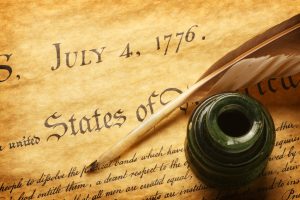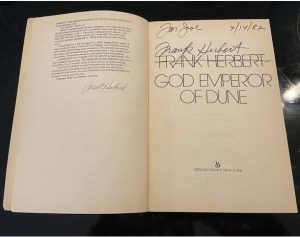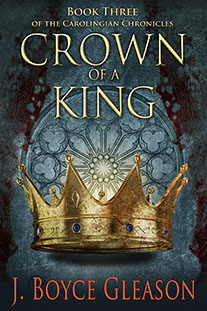
If you are looking for someone to blame for the divisiveness, acrimony, and civil unrest in today’s politics, blame Jefferson.
Had the founding father not written his immortal words in the Declaration of Independence, we wouldn’t find ourselves in the mess we’re in today.
“We hold these truths to be self-evident, that all men are created equal, that they are endowed by their Creator with certain unalienable Rights, that among these are Life, Liberty, and the pursuit of Happiness.”
In its historical context, it’s a breathtaking statement. Throughout most of history equality didn’t exist; the rich and powerful ruled and everyone else served. And, courtesy of the Catholic Church, they claimed a divine right to do so for well over a thousand years. No one considered those words let alone spoke them aloud, especially not to a king.
Philosopher John Locke had penned the phrase “life, liberty, and property,” but the pursuit of happiness? That was Jefferson lifting his middle finger to the power of any state to define the dreams of citizens.
But the pursuit of happiness? That was Jefferson lifting his middle finger to the power of any state to define the dreams of citizens.
His declaration became a clarion call for the oppressed everywhere and inspired revolutions that toppled monarchies across the globe. Throughout history people have thronged to our shores because of the promise embedded in those words.
The operative word in that sentence is “promise.” The founders knew the concept of equality was aspirational and eighty-nine years later, Lincoln affirmed it when called us “…a new nation, conceived in liberty and dedicated to the proposition that all men are created equal.”
Nearly two hundred and fifty years of experience shows that we have yet to live up to that dedication. Our history is stained with slavery, segregation, racism, sexism, and religious tyranny. They all have coexisted with our grand experiment.
At the same time, Jefferson’s words continuously call us to higher ground. It took a civil war to emancipate African Americans — and our nation — from slavery. It took one hundred and forty-four years to grant women the right to vote. Both demonstrated what Lincoln called “the better angels of our nature,” but also showed how agonizingly slow our progress towards equality actually was.
In the last sixty years, however, the American experiment has begun to bear fruit.
We ended state-sponsored segregation; we allowed the races to intermarry; we gave women control over their own bodies, their own finances and allowed them to pursue careers like their male counterparts; We championed the rights of the LGBTQ communities to pursue happiness just like the rest of us. We’ve begun to take measures (albeit slowly) to provide the diversity of our population with an equal opportunity to obtain justice, engage in society, and compete in our economy.
It’s a lot for such a short period of time, and we’re feeling the growing pains of continuous change. We struggle with how far our laws should go, and where the boundaries now are for our collective social mores. The MeToo movement led us to reexamine what are acceptable behaviors between men and women and we’re learning new language to account for sexual identity and preference. Like the argument over Miss, Mrs. and Ms., we’re debating whether or not “they” might be an option for “he and she.”
The murder of George Floyd has forced us to address the racial injustice embedded in our judicial system (albeit slowly) and we’ve begun to scour our business practices, institutions, and social media algorithms to weed out bias in their application.
There’s no guidebook for such rapid social change. And, of course, there is resistance. You can’t change the way the world has worked for two hundred and fifty years and expect everyone to be pleased. People have begun to tire of “wokeness,” being politically correct, and dealing with pronouns.
Behind this exhaustion over continuous change, however, is a more organized effort at resistance. The recent rise of nationalism (both white and Christian) is fueled by their fear of losing their traditional role in dictating the terms of equality and what constitutes the pursuit of happiness. The white nationalist “replacement theory” is a fear-based screed about the loss of power due to the growth of minority and immigrant populations. Christianity’s fifty-year campaign to rescind women’s rights over their own bodies is also a case in point. And if you read Justice Clarence Thomas’s opinion, you know they are not finished.
As a nation we will hash this out at the ballot box for years to come. But ultimately, I believe the better angels of our nature will prevail. Jefferson’s words don’t allow for compromise. We either are created equal or we’re not. We either have those inalienable rights or we do not. The words force us to continually examine the norms by which we live to see if we practice what we, and our nation, preach. We can’t afford to back away from them. They are what makes America great. They always have been.
Blame Jefferson.




 First review is in! Kirkus Reviews called Wheel of the Fates “Entertaining historical fiction, overstuffed with bloodshed, drama and desire.”
First review is in! Kirkus Reviews called Wheel of the Fates “Entertaining historical fiction, overstuffed with bloodshed, drama and desire.” 

